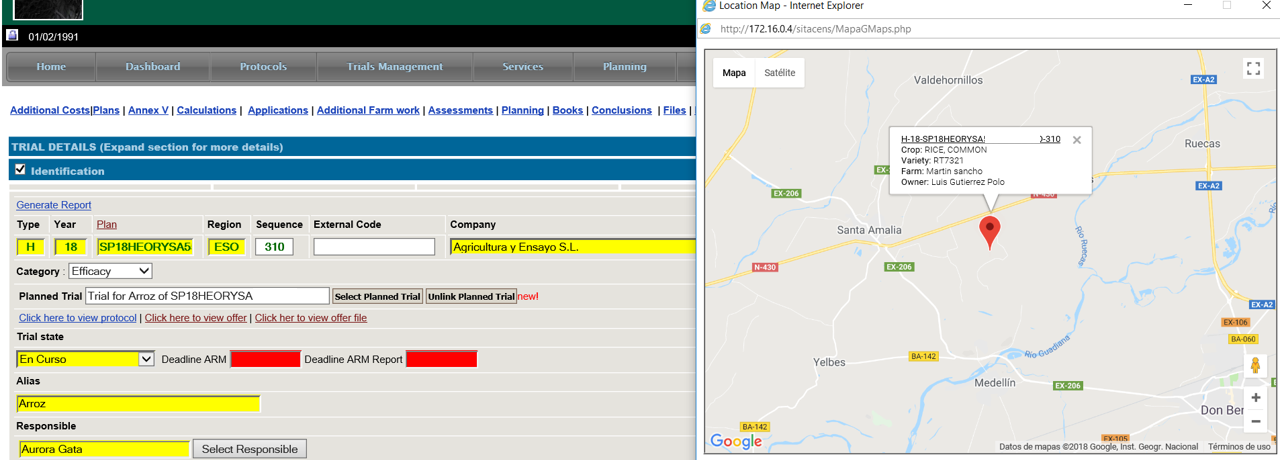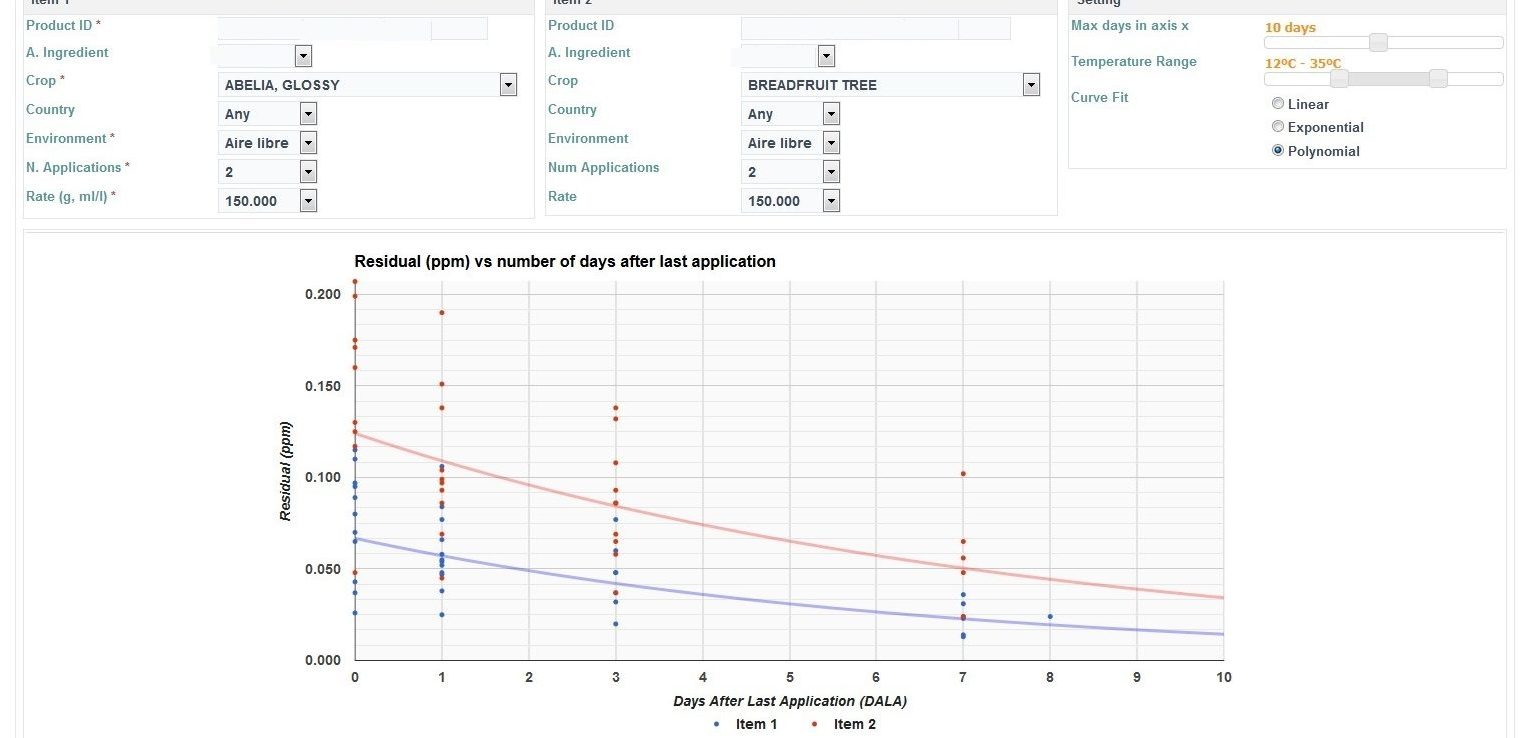How to apply digital transformation to your field trials
The companies that base their work in the realization of field trials must face the new challenges and changes that the digital transformation suppose. An important number of structures and processes must be redesigned in order to face this metamorphosis successfully. In the following lines we will try to describe a brief guide to be able to enjoy all the benefits that the implantation of digital transformation implies in your field trials.
We can understand the digital transformation as the restructuring and digitalization of work procedures and strategies of the company that is based on new technologies and that allows to obtain more benefits.
The digital transformation is intimately linked to the concept of Revolution 4.0 and hosts an important number of disciplines. Some of the most prominent are the Big Data, Internet of Things, cybersecurity, electronic signature or biometrics.
The scientific environment should not be left out of this process of change. Despite being a very specific and highly regulated sector, R + D + i companies in which field trials play an essential role must confront digitization as an almost obligatory opportunity to not stagnate and evolve as the rest of the business does.
What are the advantages of digital transformation?
As mentioned, the process of digital transformation brings with it a series of positive results for field trials. We speak of advantages that have an impact on a wide range of facets, ranging from technical aspects to the emotional ones.
One of the most obvious benefits is the automation of mechanical tasks and the consequent release of them by workers. This allows them to focus their work on aspects most relevant, thus increasing productivity and making workers feel more fulfilled professionally.
The collection and processing of large amounts of information causes the business model to be completely focused on the client and his needs. Thanks to this, you can know for sure your preferences and valuations, creating products and customized experiences.
Another aspect to consider is the cost reduction that accompanies the digital transformation. At the end of the day, the final goal of all this is the optimization of resources with the consequent savings of time, materials, transportation and multiple variables that have an economic impact on business activity.
Steps to apply digital transformation to field trials
Comprehensive trial management
With the arrival of new technologies, it has been possible to achieve greater efficiency in all aspects covered by the performance of the field trials. Today you can consult, create or modify almost any action related to a trial from a screen and anywhere in the world.
The implementation of software solutions for information management has become an obligatory measure in any leading company dedicated to make field trials. In Agricultura y Ensayos we have Sitacens for our daily work. Thanks to this software based on cloud technology we can enjoy total control over the workflow in the company.

With Sitacens you can check the current situation of the trial, manage logistical aspects, such as assigning and monitoring tasks, communicate with technicians and clients, discuss the results and manage accounting aspects. All this from an intuitive and very complete dashboard. Thanks to Sitacens, among other factors, we can offer results that satisfy the needs of our customers with total guarantee.
Field Trials Simulation
The emergence of increasingly powerful computer processors has given the necessary impetus for simulations and computational models to have acquired a privileged position in field trials laboratories.
Processes can be faithfully represented and analyzed by entering and handling data that reflects the desired conditions for that process. With these variables, the system is able, through the application of algorithms, to predict the results of the experiment in a very faithful way to those that would be achieved in a traditional way.
With experimental simulation, important benefits are enjoyed at different levels. Resources are saved as reagents and laboratory material; there is lower energy expenditure, since in most field trials it is necessary to use several electrical devices; waste and polluting emissions are reduced; less time is spent in dispensing with the waiting times required by some field trials.
The use of algorithms to achieve test results is the basis of Decline, software developed by Agricultura y Ensayo that analyzes the behavior of the residues originated. Thanks to the data collected during the field trials, Decline can predict the degradation of a product in a crop for which data are not available.

Control of environmental conditions in field trials
When carrying out field trials on crops, it is very important to have under control the environmental magnitudes that may have an impact on the final results. This is something that has been done for a long time, but using rudimentary measurement systems that did not offer sufficient guarantees.
Currently in the market you can get digital instruments that allow you to monitor, among others, magnitudes such as pressure, temperature or humidity.
A very common device is the thermo-hygrometer, which allows measuring ambient, surface and interior temperatures, humidity, atmospheric pressure and dew point. In addition, you can apply several probes, both cable and radio frequency.
The concentration of CO2 is a critical variable for plant growth, so it will be a key to have an accurate measurement of it. The current CO2 sensors are based on the absorption of infrared light by the molecules present in the measuring chamber of the device.
Digitization of data and documentation
Of all it is known that the companies that dedicate themselves to the field trials and investigation manage a considerable volume of data and critical information daily as a result of said field trials. This makes the storage and handling of these results a process to be taken into consideration during the digital transformation.
Currently there are multiple software tools that automate the process of collecting and saving field trials results from measurement systems. This information can be stored directly on an Internet server thanks to the development of cloud-based technologies.

In addition to the management of experimental data, the application of new opportunities derived from Revolution 4.0 also aims to manage the rest of the documentation related to the laboratory. An example of this is the digitization of manuals, certificates, invoices, authorizations by signatures, etc.
The availability in electronic format of all this variety of information allows it to be very simple and quick to share it with whomever it deems appropriate, eliminating geographical barriers and, therefore, streamlining procedures and procedures.
Presence in the cloud
Storing information in the cloud and cloud computing are an essential step in the process of digital transformation. In fact, it is estimated that by 2020 55% of business investment in software will be in cloud-based technologies.
The use of the cloud to store data supposes a series of evident advantages, like the saving in costs at the time of updating hardware, facilitating the access to the information and the collaborative work with geographic independence and of device and the instantaneous update of the same.
All the software solutions that we use in Agricultura y Ensayo make use of the cloud as the basis of their technology. Sitacens, Osiris and Decline store all the data that they manage in the cloud in a secure way, thus obtaining all the benefits that derive from it and that we commented previously.
Cybersecurity
Much of the information that is treated when conducting a trial is confidential. With the implementation of digital resources, the protection of all those documents stored electronically becomes a step of vital importance. According to a ZeedSecurity study, 70% of cyber-attacks target SMEs.
In addition to the protection against security attacks by hackers and malicious software, it is essential to avoid opening gaps in the systems by the employees themselves. IBM estimates that half of the security conflicts are due to mismanagement by the company.
Basic principles should be adopted such as using appropriately configured firewalls or not installing flat networks. It may also be advisable to take more advanced actions, such as the use of disruptive innovations, for example Blockchain.
Knowing how to act in case of a cyber-attack is an essential point when establishing the online safety of the laboratory. For this, the most common attack patterns must be known, as well as other data deemed appropriate. It is advisable to exchange this type of information with other companies in the sector.
Internal communication and with the client
The great advance in communication that has involved the development and foundation of digital networks has led to multiple advantages in the exchange of information. This communicative flow can occur in several directions and senses, both within the company itself, and between it and external agents such as customers and suppliers.
On the other hand, new communication channels have been opened with current and potential clients or other members of the same productive sphere thanks to tools such as social networks or email marketing. With these advances it is easier to create communities of people related to the interests of the sector, developing positive synergies for all those involved.
The communication paths opened by the digital transformation are not only directed towards the exterior, but also reach all areas of the laboratory itself. New technologies allow us to enjoy greater efficiency in the transmission of content between different departments and positions, regardless of the physical distance itself.
As it has been proved, the digital transformation of the field trials is a very complex process that covers a great variety of aspects. Due to this complexity, the associated philosophy must be very well assimilated by the whole team, since for many it supposes a substantial change in the way of working. All this must be something more than a passing fad, applied in a sustainable way.
With the digital transformation, time and costs are saved thanks to the automation and virtual simulation of processes; you can create predictive models that allow a more efficient management of laboratory resources; the improvement in internal and external communication systems is also notable, with customers, suppliers, other companies and the general public.
As a result of the digitization of data, it will be necessary to establish new security procedures and habits to protect them. Therefore, it may be necessary to have specialized cybersecurity personnel, in addition to training operators in certain basic aspects.
In spite of all the benefits that it brings and that have been mentioned, the digital transformation does not enjoy good figures in the chemical industry. According to a study by Deloitte and MIT Sloan Management Review in 2017, half of the companies in the sector do not have a digital transformation strategy in place, with European companies being the most receptive to this process.
It is more than obvious that any company that dedicates itself to field trials and does not wish to slow down its growth must face its digital transformation in the short or medium term. It is not a simple process and requires an important investment of economic, technical and human resources but, if done correctly, it will have a very positive effect on the results.


Leave a Reply